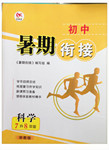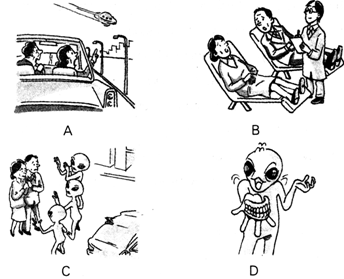ÌâÄ¿ÄÚÈÝ
LONDON (Reuters) ¡ª British milkman Steve Leech, who saved several shops and flats by putting out a fire with 320 pints of milk, was celebrating Thursday after winning a national bravery award.
Leech, 35, named ¡°Hero Milkman¡± by the National Dairymen¡¯s Association, said that he had noticed smoke coming out of a shop in Cornwall, southern England, while delivering (µÝËÍ) milk as usual a year ago.
¡°I saw the flats up above and thought I¡¯d better do something. So I kicked the door in and started pouring milk everywhere,¡± Lee told Reuters Thursday.
¡°When firemen arrived, the fire was almost out,¡± he said. Firemen said he had helped save the lives of eight people living in the flats above the shops.
¡°It was hard work opening all those bottles, especially since they have tamper-proof lids. But it was even harder trying to explain to my boss where all the milk had gone.¡±
СÌâ1: This is a(n) _______ from London.
СÌâ2: Leech was awarded the prize for his _______.
СÌâ3: Which is the correct order of what Leech did about a year ago?
¢ÙThe fire was almost put out. ¢ÚHe kicked the door in.
¢ÛHe noticed smoke coming out of a shop. ¢ÜHe delivered mile as usual.
¢ÝHe poured milk everywhere.
СÌâ4:The underlined sentence in the last paragraph suggests (°µÊ¾) that tamper-proof lids add to the difficulty of _______ those bottles.
СÌâ5: Which is NOT TRUE according to the passage?
Leech, 35, named ¡°Hero Milkman¡± by the National Dairymen¡¯s Association, said that he had noticed smoke coming out of a shop in Cornwall, southern England, while delivering (µÝËÍ) milk as usual a year ago.
¡°I saw the flats up above and thought I¡¯d better do something. So I kicked the door in and started pouring milk everywhere,¡± Lee told Reuters Thursday.
¡°When firemen arrived, the fire was almost out,¡± he said. Firemen said he had helped save the lives of eight people living in the flats above the shops.
¡°It was hard work opening all those bottles, especially since they have tamper-proof lids. But it was even harder trying to explain to my boss where all the milk had gone.¡±
СÌâ1: This is a(n) _______ from London.
| A£®poster | B£®review | C£®advertisement | D£®news report |
| A£®hard work | B£®brave behaviour |
| C£®invention | D£®patriotic behaviour |
¢ÙThe fire was almost put out. ¢ÚHe kicked the door in.
¢ÛHe noticed smoke coming out of a shop. ¢ÜHe delivered mile as usual.
¢ÝHe poured milk everywhere.
| A£®¢Ù¢Ú¢Û¢Ü¢Ý | B£®¢Ü¢Ú¢Û¢Ý¢Ù | C£®¢Û¢Ü¢Ù¢Ú¢Ý | D£®¢Ü¢Û¢Ú¢Ý¢Ù |
| A£®stealing | B£®breaking | C£®opening | D£®wasting |
| A£®Leech put out a fire with milk at the age of 34. |
| B£®Cornwall is in the north of England. |
| C£®Leech saved eight people in the shops. |
| D£®The fire was already out before firemen arrived. |
СÌâ1:D
СÌâ1:B
СÌâ1:D
СÌâ1:C
СÌâ1:B
¡¾Ö÷Ö¼´óÒâ¡¿±¾ÎĽéÉÜÓ¢¹úËÍÄ̹¤Leech,ÓÃÅ£ÄÌÆË»ð¾ÈÈ˲¢±»ÊÚÓèHero MilkmanµÄÐÂÎű¨µÀ¡£
СÌâ1:ÍƶÏÀí½âÌâ. ´ÓÈ«ÎÄ¿ÉÒÔÍƶϳö´ËÎÄÊÇһƪÐÂÎű¨µÀ¡£
СÌâ1:ϸ½ÚÀí½âÌâ. ´ÓµÚÒ»¶Îafter winning a national bravery award.µÚ¶þ¶ÎHero Milkman¿ÉÒԵóö´ð°¸¡£
СÌâ1:ϸ½ÚÀí½âÌâ. ´ÓÎÄÕµڶþ¡¢Èý¡£ËĶοÉÒԵóöDÊÇÕýÈ·´ð°¸¡£
СÌâ1:ϸ½ÚÀí½âÌâ. ´Ó×îºóÒ»¶ÎÖ±½Ó¿ÉÖª¡£
СÌâ1: ϸ½ÚÀí½âÌâ. ´ÓCornwall, southern England,¿ÉÖªBÊÇ´íÎó´ð°¸¡£

Á·Ï°²áϵÁдð°¸
 ³õÖÐÊîÆÚÏνÓϵÁдð°¸
³õÖÐÊîÆÚÏνÓϵÁдð°¸
Ïà¹ØÌâÄ¿

